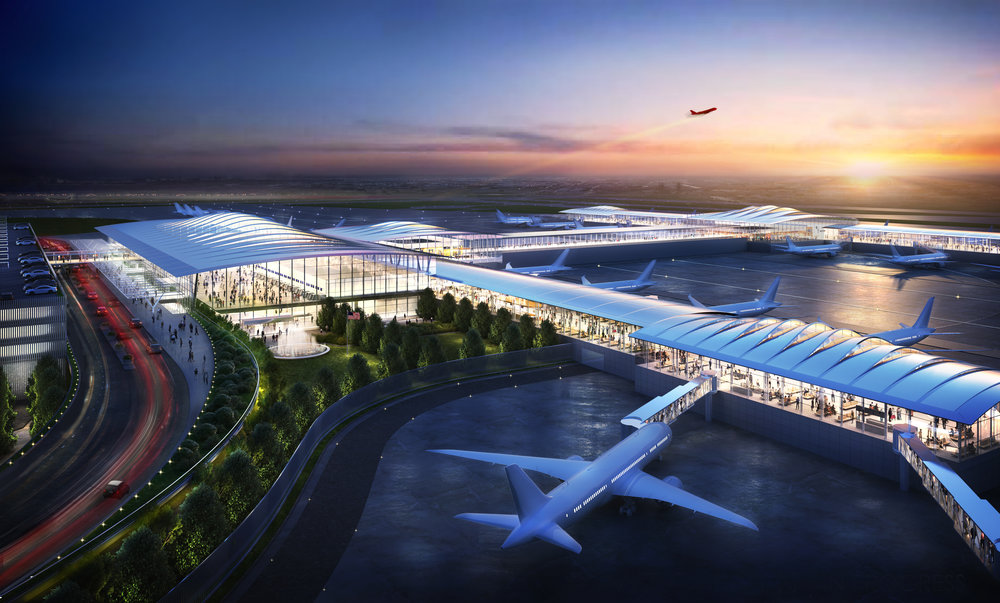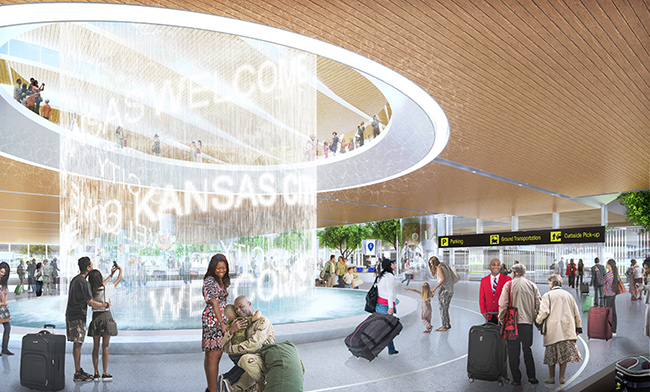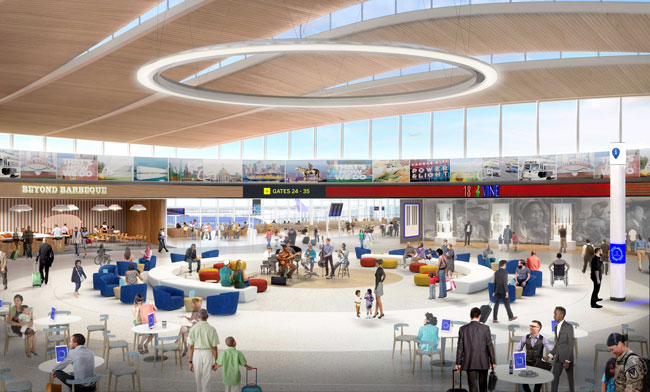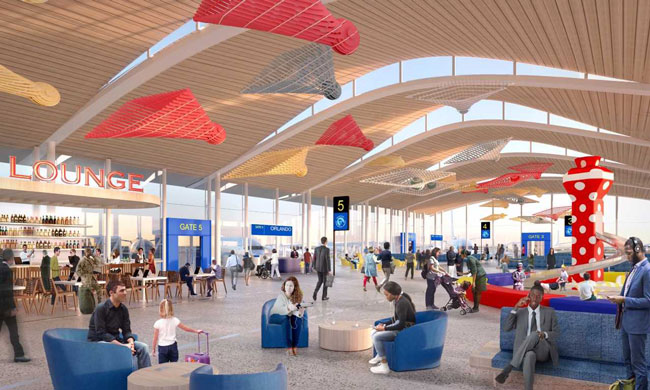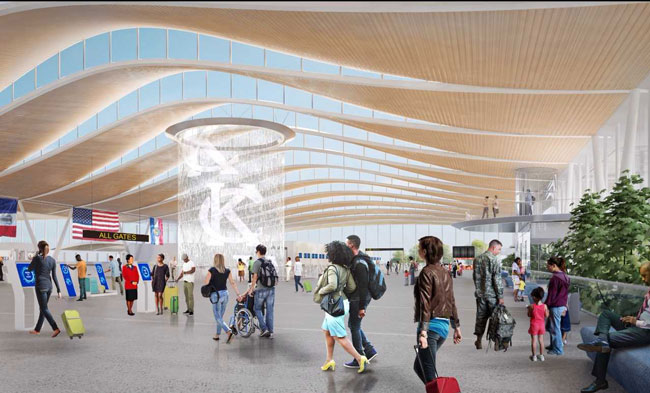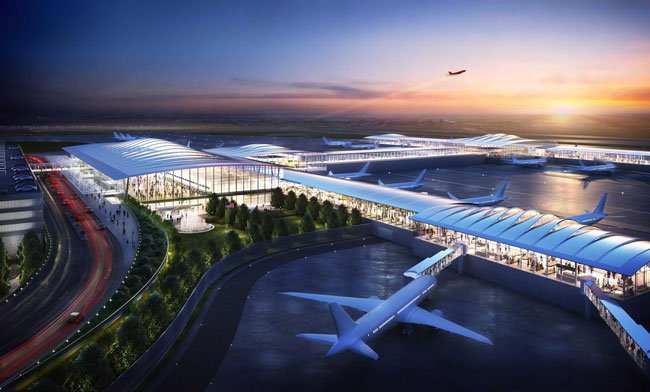Update: The votes are in! And turnout was high for a mid-term election! Check out Startland’s coverage of Tuesday’s KCI airport vote by clicking here.
After more than five years of deal-making and debate, the time has come for Kansas City, Missouri, voters to decide the fate of the city’s current 45-year-old airport.
On the Nov. 7 ballot: a new single-terminal facility that would replace the current three-terminal Kansas City International Airport.
The vote marks a “generational decision” for Kansas City, said Tim Cowden, CEO of the Kansas City Area Development Council, which supports the single-terminal plan.
Residents of Kansas City, Missouri, are eligible to vote Tuesday on the following ballot question:
Shall the City of Kansas City be authorized to construct a new passenger terminal at Kansas City International Airport and demolish existing terminals as necessary, with all costs paid solely from the revenues derived by the City from the operation of its airports and related facilities, and without the issuance of general airport revenue bonds unless such general airport revenue bonds have received prior voter approval?
Let’s take a deeper look at the path to the single-terminal vote, the controversy sparking opposition, and the implications for Kansas City if it passes (or fails).
How does the city plan to finance the single-terminal airport?
The ballot question states that the airport project — estimated at about $1.3 billion — cannot use taxpayer dollars, begging the question: So who will pay for it?
The city says the single-terminal airport would be financed by the airlines flying in and out of it, as well as by revenue generated at the airport, including parking and concessions.
Although usage estimates vary, Wi-Fi studies have shown that only 12 percent of KCI passengers are from Kansas City, with 29 percent from Missouri, 33 percent from Kansas and 38 percent from other states, according to The Kansas City Star.
The city reiterates it will not use general fund dollars to fund the airport and will not grant tax incentives for the design or construction of the project.
Edgemoor Real Estate & Infrastructure, the lead developer for the airport project, is responsible for covering any costs that exceed the project’s budget, the city says.
Discussing pressure from the airlines for Kansas City to build a single terminal, Gary Kelly, CEO of Southwest Airlines, said it’s rare for an airline to be as actively involved in pushing a city for a new airport, but that is the case in Kansas City, he said. Southwest is happy to help cover the cost to make the single terminal a reality, he added.
“I can assure you there will be no taxpayer money (spent),” Kelly told a crowd gathered Oct. 27 for the KCADC’s annual meeting. “In fact, the airlines are on the hook to pay the bills for the capital improvement. … This is a great city. It deserves a great airport. We are unequivocal in our support for the single terminal.”
Why a single-terminal airport?
Although taxpayer dollars wouldn’t be used to cover the $1.3 billion project, the city adopted an ordinance in 2014 that forces any changes to the airport to be put to voters in the form of a ballot question like the one slated for Tuesday’s vote.
A single-terminal airport would best fit the needs of today’s economy, said Kansas City Mayor Sly James, who told the KCADC crowd he regularly gets complaints from frequent fliers and business people about the airport’s inconvenient nature, as well as fewer direct flights — especially international flights.
“This is a key issue,” James said. “It was a key issue for Amazon, a key issue with the World Cup, a key issue with the National Collegiate Athletic Association and with business. It was an issue when the Republican National Convention was thinking of coming to this city but didn’t. … We need to move forward as a city in order to continue to promote and bring business.”
Proponents of the single terminal cite studies showing KCI consistently ranked near the bottom of the nation’s mid-sized airports. Past discussions on addressing such concerns have included renovating the current airport, opening more gates and constructing more terminals. In partnership with the Kansas City Aviation Department and airport terminal experts from across the country, the city concluded that building a new single-terminal is the cheapest, most efficient option.
The existing space also is too small and the configuration cannot accommodate larger planes nor current security measures, the city states on its website.
“One thing I am always telling people is that we cannot think about things in terms of today,” James said. “What is good today is not necessarily going to be good tomorrow. We have to also be thinking about what will be needed the next five, 10, 15 and 40 years. A new airport terminal is one of those things.”
When you understand the impact the airport has on its partners, like Southwest Airlines, the need for a single-terminal becomes more clear, James added.
Southwest’s Kelly said the most pressing issue at KCI is the airline’s need for a greater ability to allow connecting flights. A single-terminal would address that concern, he said.
“We all know how important airports are for the business community,” Kelly said. “I often hear business leaders here today tell me, ‘We’re concerned about not being able to grow the flights. We’re concerned about whether we should relocate our employees.’”
What’s the most recent design plan?
The Edgemoor team revealed renderings Oct. 5 for the proposed single-terminal.
The $1.3 billion project is expected to feature two concourses with 35 gates. Passenger arrivals and departures would be on separate levels. With two-level curbside pickup and drop-off areas, the design features more plentiful parking (for about 6,500 cars) and more spacious waiting areas, according to Edgemoor.
Designed by SOM Architects, the energy-efficient, H-Shaped structure would offer just one, 12-lane TSA checkpoint queue, and more food options after passing through security. Although the design features longer walks to gates, the plans call for people-movers to improve the flow of travelers.
Inspired by the City of Fountains’ history and culture, the single-terminal also is expected to include a two-story water feature in the center of the terminal. Messages, designs and colors would be projected onto the cascading water, welcoming travelers, Edgemoor said.
So why the controversy?
Although the city has repeatedly said the project will not use taxpayer dollars, some Kansas City area residents are skeptical.
A group called the Citizens for Responsible Government is urging citizens to vote “no” on the single terminal, stating that the city ought to be more transparent on its special development projects.
“Our elected officials at city hall enjoy spending taxpayer’s money,” the Citizens for Responsible Government’s website states. “They don’t seem to understand it’s our money and they are spending it like there is no tomorrow.”
Dan Coffey, treasurer of Citizens for Responsible Government, suggests that the city is “absolutely” not making the necessary repairs to KCI as a strategy to win support for the swanky, new terminal, The Kansas City Star reports.
“Just look around. Broken light bulbs. Toilets that don’t work,” Coffey told the Star.
The city calls such claims “preposterous.”
The Star’s Steve Kraske said the metro’s struggle to implement a new airport is a reminder of the region’s long history of resistance to change.
“Remember what so many people said when Kansas City leaders set out to build the Sprint Center?” Kraske reminded readers. “‘We don’t need it. Kemper Arena still has years of life. We’re wasting our money.’ … But build it we did. And the city never looked back.”
What happens after the vote?
If Kansas City, Missouri, voters say “yes” to a new airport, the next step includes negotiating a memorandum of understanding and then a final contract with Edgemoor. In addition, the design team would plan a series of open house events in November and December to collect feedback from residents.
The single-terminal would be built on the site of KCI’s Terminal A, which has been closed for several years following airline mergers. During construction, Terminals B and C would continue to operate as usual until 2021, when the single terminal would be slated for completion.
And if voters reject the ballot question?
Dave Helling, an editorial writer and columnist for The Star, said Wednesday the issue could be dead for the next five years or more as city leaders pull back from the hot-button topic. In the meantime, the airport presumably would continue its current operations.
Kansas City’s mayor, whose final term ends in 2019, however, did not seem willing to end the fight.
“The people of Kansas City have shown a remarkable willingness and ability to step up when they are aware of things that will move this city forward,” said James. “We’ve seen it time and time again. Kansas City cannot move forward at the pace that we should and could without a new terminal: It’s just that simple.”



